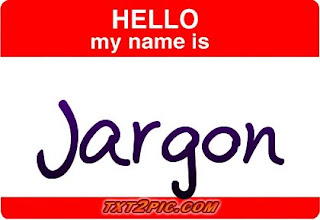
Jargon: Structural determinants
Translation: The general, system things that affect a situation. This might include gender roles within a culture, climate, or the economic environment.
Translation: Women in the developing world tend to have substantially less time than men do, because of the burden of household chores and child care. This means that women have more difficult accessing medical care, for example, because they cannot spare the time to go to a clinic.

Stakeholder – A stakeholder is anyone who cares about a particular project or institution. Stakeholders in a new housing development might include neighbors of the new development, local businesses, the company doing the developing, local and national housing authorities, people who want to live in the new development, and the owners of the land where the housing will be built. The word stakeholders is actually literal – everyone who has a stake in what’s going on. It seems like jargon, but I am not sure it is.
Stakeholder is a word people love to hide behind. It’s easy to say you’ll involve stakeholders in your decision-making without seriously thinking about who those stakeholders are or how you’ll involve them. You can claim you’ve met with “stakeholders” and make it sound comprehensive, when you’ve only included a few of the people who care about your project. (If you’re being particularly transparent, you call them “key stakeholders” to justify your limited outreach.)
Capacity Building – This is another term which means something important and is often used as a shield. In its simplest form, capacity building is teaching; when you take it further, things get more complicated. (For one thing, you need to give people tools they can use to keep learning.) The idea of capacity building is that even with enough people and enough money, you may not be able to govern, solve problems, or function. One example would be FEMA in the Katrina response – they had money and staff but weren’t able to actually provide rapid emergency help. They lacked the capacity to do hurricane response. If, say, Switzerland’s national emergency operations center sent people to do a series of workshops for FEMA officials, monitored the agency, and took them through some disaster response exercises, that would be capacity building. And next time a hurricane hit hard, FEMA could use the resources it already has to help hurricane survivors in a timely way.
(this entry is dedicated to pragzz)
(Photo credit: AlphachimpStudio)
Translation: This isn’t exactly jargon, because food aid is exactly what it sounds like. Food, given away to people who need it. It may be given in a food-for-work scheme, where the donor has people do work for the common good such as digging latrines or rebuilding schools in return for the food. It may just be distributed according to some criteria about who is sufficiently in need (very often female-headed households).
The thing about food aid, though, is it is almost never locally purchased. It is generally produced in the donor country, and purchased from those domestic farmers, then shipped abroad as food aid. This supports a domestic market and farmers in the donor country. If food is purchased in the recipient country from local markets, we usually don’t call it food aid. We just call it hunger relief, or “an effort to improve food security.”
Jargon: Burn Rate
Meaning: How much a development project spends each month, or each year. You need to keep an eye on your burn rate to make sure that you’re not going to be overspent by the end of your project or not spend all your money and have to give it back to the donor (and do less work than you could have.)

Jargon of the Day: Monetization
Meaning: Monetization means something slightly different in a humanitarian and development context than it does in social media. In this case, it means selling food aid commodities in order to take the money and fund non-food projects. Many, perhaps most, food aid projects are actually monetization projects. It’s often the most useful thing to do with donated rice or flour.
I hate this word because it keeps you from thinking about what a convoluted process selling commodities actually is. It’s a tidy, professional-sounding word that covers up the fact that we are taking American-grown commodities, selling them in foreign countries, and then using the money for projects. Perhaps we should just donate money in the first place?